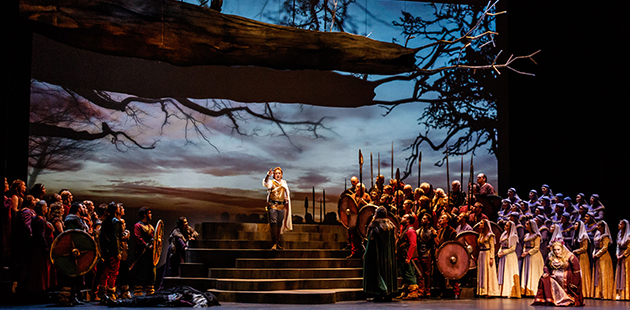 You know it’s a good show when you leave the theatre and suddenly become aware of how weary you feel. You check the time and can’t work out where a smidge over four hours went, but then you remember: Wagner.
You know it’s a good show when you leave the theatre and suddenly become aware of how weary you feel. You check the time and can’t work out where a smidge over four hours went, but then you remember: Wagner.
Richard Wagner’s Lohengrin is the story of Elsa, who is accused by her father of being complicit in the death of her brother. Lacking a champion to fight for her, her prayers are answered with the arrival of Lohengrin. He defends Elsa’s honour and they fall in love, however, he and his origins are a mystery. No one even knows his name, but if his name and background are revealed, then he loses his power, and there are some who would love nothing better than for that to happen.
The set was a set of stairs, stretched along two thirds of the stage. Above it, in the first and last acts, was an enormous branch suspended over the actors. Behind the stairs was a screen for rear projection, an effective way to set each scene, particularly in how it was used.
At the beginning of each Act, the music would swell, the curtain would rise, and the audience were presented with a giant grey screen. Then, after a few seconds of void, an image would gently come into view. It lent so much of the subsequent action the feel of a fairy tale, a visual, “Once upon a time,” as details revealed themselves one after the other as one does when telling a story.
Marius Vlad lacked a little presence when he first appeared as Lohengrin in the 1st Act, but quickly found his feet (and status). While Lohengrin is the hero, he isn’t written without flaws. Marius conveys Lohengrin’s desperate wish for peace and love despite knowing this world will not allow him either.
Helena Dix gave a wonderful performance as Elsa, particularly in the 3rd Act. A good portion of this final third is one long scene between Elsa and Lohengrin and Helena’s vocals here were beautiful.
Hrólfur Sæmundsson did splendid work as Elsa’s father, Friedrich. Vulnerable at the loss of his son, cruel to his remaining daughter, manipulated by his mistress – Friedrich’s journey is perhaps the most turbulent. Hrólfur communicated a thick mix of guilt, anger, and shame through his compelling performance.
Friedrich’s mistress, Ortrud, was played by Sarah Sweeting. Wrapped in purple and fur like a regal plum-coloured companion, Sarah did well to balance Ortrud’s scheming and hurt with a sense of black humour. Ortrud plots, but she also has a fantastic maniacal laugh like she had just tied her victim to railway tracks.
It speaks to the quality of the show that the running time was barely felt. Lohengrin succeeds in not only showcasing Melbourne Opera’s vocal and musical talent, but also their storytelling.
Lohengrin
Regent Theatre, Collins Street, Melbourne
Review date: Monday 7 August 2017 – 7.00pm
Performances: 10 & 12 August 2017 – 7.00pm
Bookings: www.ticketmaster.com.au
Robert Blackwood Hall, Monash University, Clayton
Performance: Saturday 19 August 2017 – 7.00pm
Bookings: www.mapa.monash.edu
For more information, visit: www.melbourneopera.com.au for details.
Image: Marius Vlad as Lohengrin with the Melbourne Opera Chorus – photo by Robin Halls
